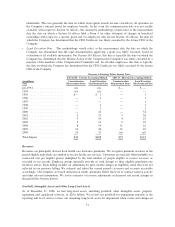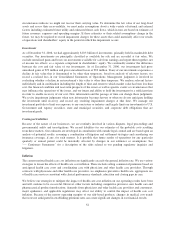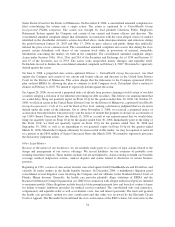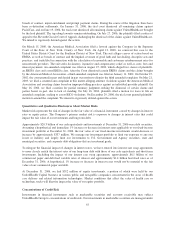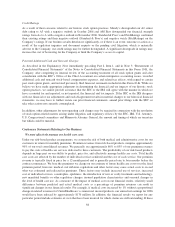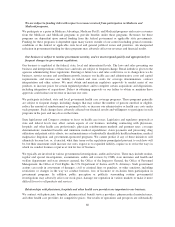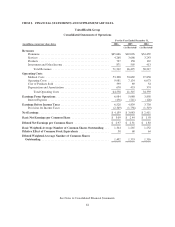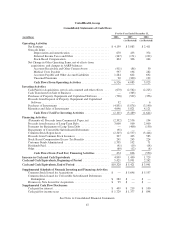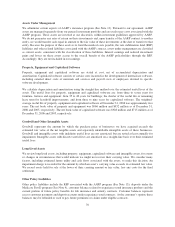United Healthcare 2006 Annual Report Download - page 62
Download and view the complete annual report
Please find page 62 of the 2006 United Healthcare annual report below. You can navigate through the pages in the report by either clicking on the pages listed below, or by using the keyword search tool below to find specific information within the annual report.We are subject to funding risks with respect to revenue received from participation in Medicare and
Medicaid programs.
We participate as a payer in Medicare Advantage, Medicare Part D, and Medicaid programs and receive revenues
from the Medicare and Medicaid programs to provide benefits under these programs. Revenues for these
programs are dependent upon annual funding from the federal government or applicable state governments.
Funding for these programs is dependent upon many factors outside of our control including general economic
conditions at the federal or applicable state level and general political issues and priorities. An unexpected
reduction in government funding for these programs may adversely affect our revenues and financial results.
Our business is subject to routine government scrutiny, and we must respond quickly and appropriately to
frequent changes in government regulations.
Our business is regulated at the federal, state, local and international levels. The laws and rules governing our
business and interpretations of those laws and rules are subject to frequent change. Broad latitude is given to the
agencies administering those regulations. Existing or future laws and rules could force us to change how we do
business, restrict revenue and enrollment growth, increase our health care and administrative costs and capital
requirements, and increase our liability in federal and state courts for coverage determinations, contract
interpretation and other actions. We must obtain and maintain regulatory approvals to market many of our
products, to increase prices for certain regulated products and to complete certain acquisitions and dispositions,
including integration of acquisitions. Delays in obtaining approvals or our failure to obtain or maintain these
approvals could reduce our revenue or increase our costs.
We participate in federal, state and local government health care coverage programs. These programs generally
are subject to frequent change, including changes that may reduce the number of persons enrolled or eligible,
reduce the amount of reimbursement or payment levels, or increase our administrative or health care costs under
such programs. Such changes have adversely affected our financial results and willingness to participate in such
programs in the past, and may do so in the future.
State legislatures and Congress continue to focus on health care issues. Legislative and regulatory proposals at
state and federal levels may affect certain aspects of our business, including contracting with physicians,
hospitals and other health care professionals; physician reimbursement methods and payment rates; coverage
determinations; mandated benefits and minimum medical expenditures; claim payments and processing; drug
utilization and patient safety efforts; use and maintenance of individually identifiable health information; medical
malpractice litigation; and government-sponsored programs. We cannot predict if any of these initiatives will
ultimately become law, or, if enacted, what their terms or the regulations promulgated pursuant to such laws will
be, but their enactment could increase our costs, expose us to expanded liability, require us to revise the ways in
which we conduct business or put us at risk for loss of business.
We typically are involved in various governmental investigations, audits and reviews. These may include routine,
regular and special investigations, examinations, audits and reviews by CMS, state insurance and health and
welfare departments and state attorneys general, the Office of the Inspector General, the Office of Personnel
Management, the Office of Civil Rights, the U.S. Department of Justice and U.S. Attorneys. Such government
actions can result in assessment of damages, civil or criminal fines or penalties, or other sanctions, including
restrictions or changes in the way we conduct business, loss of licensure or exclusion from participation in
government programs. In addition, public perception or publicity surrounding routine governmental
investigations may adversely affect our stock price, damage our reputation in various markets or make it more
difficult for us to sell products and services.
Relationships with physicians, hospitals and other health care providers are important to our business.
We contract with physicians, hospitals, pharmaceutical benefit service providers, pharmaceutical manufacturers,
and other health care providers for competitive prices. Our results of operations and prospects are substantially
60



